#Attlee
Text

#art#artists on tumblr#my art#artwork#digital art#meme#original art#digital illustration#advertising#fanfic#twisted wonderland#winter wonderland#wonderland#wonderlands x showtime#wonderland aesthetic#wonderland oc#deadman wonderland#alice in wonderland#rotomblr in wonderland#red queen#alice through the looking glass#Attlee
10 notes
·
View notes
Text
At the end of the second world war, the Labour government found itself involved in three military interventions, in Indo-China, Indonesia and in Greece, all initiated while Labour had been in coalition with the Conservatives, but now enthusiastically continued. In Indo-China, British troops intervened in the south of the country to restore French colonial rule. The first British and Indian troops arrived in Saigon in early September 1945 (by which time Attlee had taken office). They were welcomed as liberators by the Vietnamese, who were under the sadly mistaken impression that the Allies were going to recognise their independence. The British soon came into conflict with the Communist-led Vietminh nationalist opposition. By the beginning of October, there were over 20,000 British and Indian troops in the city, engaged in a running battle with the rebels. Artillery was used against rebel positions inside the city and, according to one contemporary account, the British ‘deliberately burned down great sections of the native quarter in Saigon’. The situation became so desperate that the British rearmed surrendered Japanese troops to help suppress the Vietminh. By the time the British handed over to the French, over forty British and Indian soldiers had been killed. The British claimed to have killed over 600 Vietminh fighters, but the death toll, including civilians, was certainly much higher. The British were also involved in restoring French control in Cambodia, with a small British force being despatched to Phnom Penh where they once again rearmed Japanese troops to help maintain order.
John Newsinger, War, Empire and the Attlee government 1945–1951
47 notes
·
View notes
Note
Who was the greatest British prime minister: Pitt the Elder or Lord Palmerston? And did Wade Boggs deserve to get punched for saying Pitt the Elder?
It's Clement Attlee with a steel chair!

But between the two in contention at Moe's, yeah it's clearly Pitt the Elder.
34 notes
·
View notes
Text
youtube
‘Attlee was to become very close to George VI. He enjoyed the king’s informality. He noted how Queen Victoria had made her ministers stand in her presence whereas George VI preferred a cigarette and a gossip.’
Citizen Clem: A Biography of Attlee. John Bew, 2016.
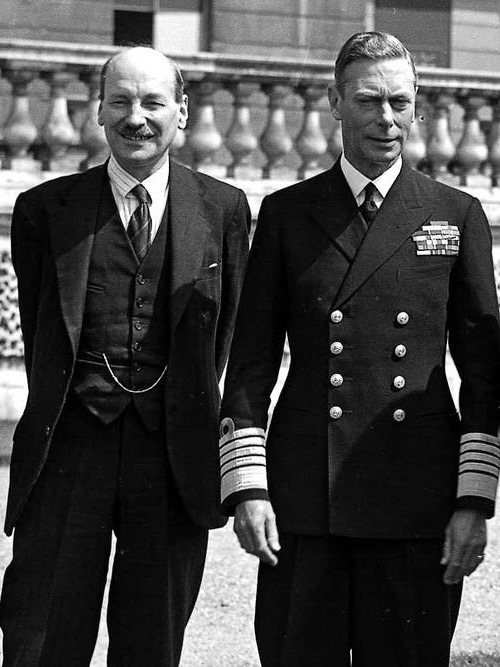
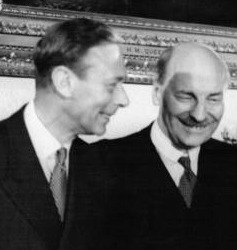
#oh bertie you big gossip!#king george vi#george vi#god save the king#the british royal family#the monarchy#the royal family#the british monarchy#albert duke of york#long live the king#british royal family#clement Attlee#Youtube
20 notes
·
View notes
Text
On 7 February 1952, the Queen and Prince Philip arrived at London Airport after a nineteen-hour flight from Kenya, following the death of King George VI.

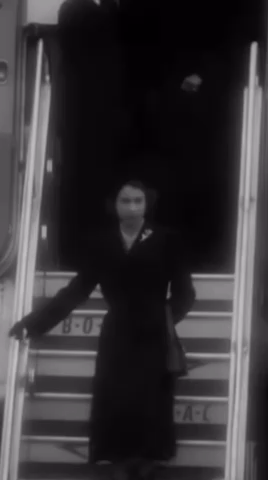
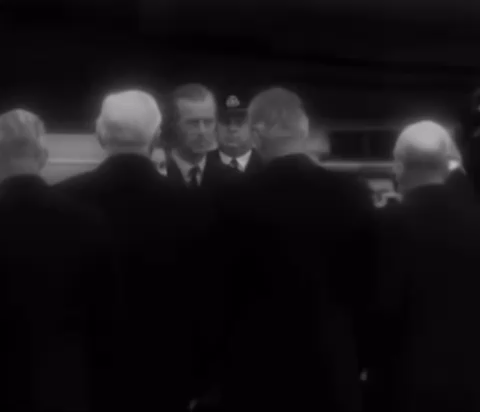

“When it landed at London Airport at 4 P.M. local time, a few moments passed before she emerged alone. Philip had decided to remain inside the aircraft until she had descended the steps to be greeted by Clement Attlee, Anthony Eden and Prime Minister Churchill, who was unable to control his tears. Philip now appeared at the top of the gangplank, his tall, craggy figure somehow dwarfing his wife as he stood behind her.”
Royal Sisters by Anne Edwards
112 notes
·
View notes
Text

Clement Attlee
#suitdaddy#suiteddaddy#suit and tie#men in suits#suited daddy#suited grandpa#suitedman#suit daddy#suitfetish#buisness suit#suited men#suited man#suitedmen#british man#british men#member of parliament#house of commons#uk labour party#uk pm#Clement Attlee
9 notes
·
View notes
Text


“so, the princess and the bodyguard, eh?”
“bit of a cliché, really.”
#posts this self indulgent mess and goes tf to sleep 🛌 snork mimimimi#before anyone gets confused thea’s aesthetic here is her pre-trauma/reign aesthetic !! before the atrocities <3#yes she’s like twenty when she becomes a war criminal <3#fable#fable 3#edit*#ch: thea attlee#ch: august dyer#i’m like dropping hints august hates reaver *calls him his fucking nemesis*#immortal magic has nothing on august just leave him in a room with reaver for five minutes and he’ll get the job done hdjdnfhdj
67 notes
·
View notes
Photo
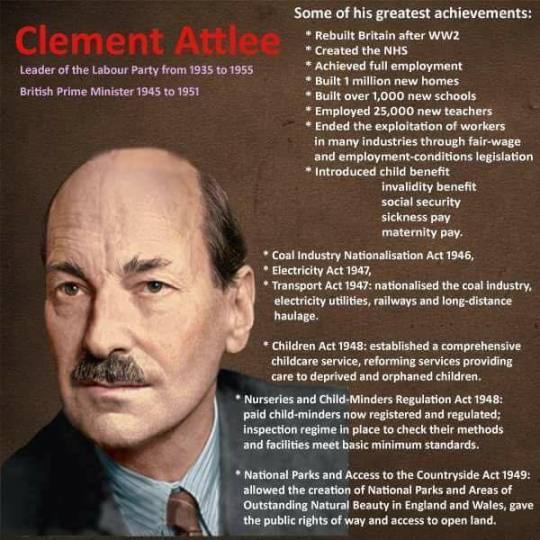
In memoriam
CLEMENT RICHARD ATTLEE
3rd January 1883 - 8th October 1967
Greatest PM the UK has ever had.
5 notes
·
View notes
Note
thoughts on the tories?
Fuck the tories
#although no political party in the uk really aligns completely with my views#Labour Party in 1945 is v in tune with my beliefs#Clement Attlee really was that bitch#but everything has just moved right over the years
6 notes
·
View notes
Text
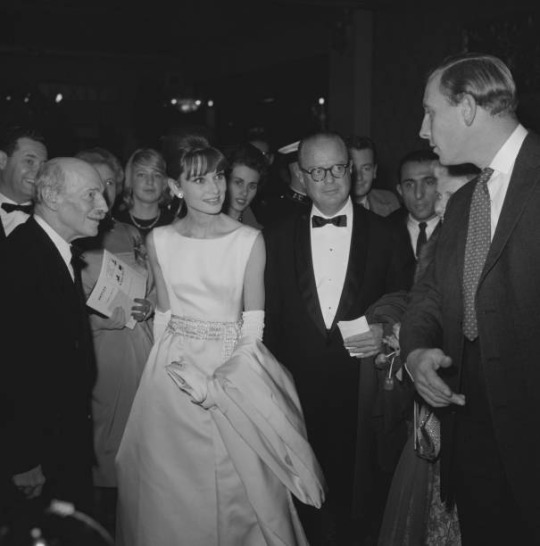
Audrey Hepburn, former British Prime Minister Lord Attlee, and George Weltner of Paramount Pictures at a charity premiere of Breakfast at Tiffany's in London
Photography by George Freston
October 19, 1961
#audrey hepburn#london#george weltner#lord attlee#paramount pictures#premiere#breakfast at tiffany's#charity#vintage#classic#style#photography#fashion#old hollywood#old hollywood glamour#movies#1961#1960s#personal#candid
8 notes
·
View notes
Text
Imagine if in July 1940 Churchill blew up de Gaulle showing off his wee new anti tank bomb.

Would that had been a net positive or negative for mankind?
Questions......
#Churchill nearly killing Clement Attlee at Gallipoli vs Churchill nearly blowing up de Gaulle at Chequers FIGHT#history#wwii#winston churchill#charles de gaulle
13 notes
·
View notes
Text
When Labour took office, far from regarding MI5 as any sort of threat, they saw the agency as ‘an important instrument of government’ and ‘fully appreciated MI5’s value’. The ‘Zinoviev Letter’ was very much in the past as far as Attlee and his colleagues were concerned. Indeed, the extent to which Attlee was personally comfortable with MI5 and its activities is perhaps best shown by the fact that he was the first Prime Minister to visit MI5 headquarters and actually wrote a ‘Preface’ to the memoirs, Cloak without Dagger, of MI5’s Director-General, Percy Sillitoe. Once in office, Attlee relied on MI5 to spy on those Labour MPs suspected of being ‘crypto-Communists’ as well as on CP activities in the trade unions. In November 1947, he was particularly worried about supposedly Communist-instigated strikes disrupting the Royal wedding and was considerably reassured when told that MI5 ‘had quite a number of agents in the Communist Party who were well placed’. By 1949, Attlee had been convinced by MI5 that the Communists were behind the increasing industrial unrest that the Labour government’s ‘Austerity’ regime was provoking and that they were trying ‘to overturn social democracy’. In July of that year, a general lockout on the London docks where dockers were refusing to unload two Canadian ships crewed by scabs saw the government send in over 12,000 troops to try and break this tremendous display of international solidarity which was predictably condemned as Communist-inspired. Bevan, of all people, condemned the dockers’ action as ‘a betrayal of the labour movement’ and the Transport and General Workers Union subsequently expelled or suspended the dockers’ unofficial leaders from the union.
John Newsinger, Hope Lies in the Proles: George Orwell and the Left
34 notes
·
View notes
Text
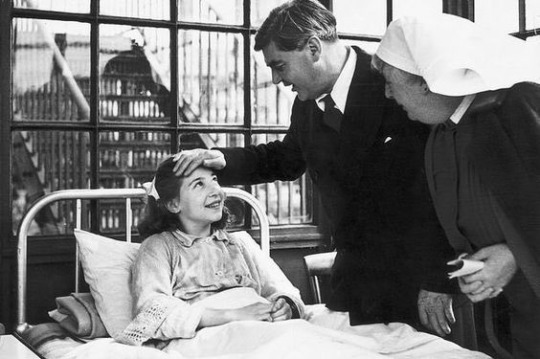
The National Health Service (NHS) was the key institution that would form the definitive legacy of the Attlee Government, elected this month in 1945.
The first moves toward universal healthcare and 'cradle-to-grave' care had begun under the wartime coalition government, detailed in a report compiled by economist Sir William Beveridge in 1942. BBC radio at the time described Beveridge as 'the recognised authority on present day and post war problems'.
"...The security plan in my report has three sides to it. First, an all in scheme of social insurance. Second, a scheme of children’s allowances. The report proposes third, an all in scheme of medical treatment…We shall take the first step to security with freedom, and with responsibility..."
Minister of Health (and Housing), Aneurin (Nye) Bevan, said of the existing fragmented health system;
"…Our hospital organisation has grown up with no plan, with no system; it is unevenly distributed over the country…I would rather be kept alive in the efficient if cold altruism of a large hospital than expire in a gush of warm sympathy in a small one…"
One of the inconsistencies, or injustices, of the incumbent arrangements was that general health cover provided by a limited national insurance scheme for those lucky enough to be in employment before the war, did not even extend to workers’ own families.
Every year, thousands died of infectious diseases including pneumonia, meningitis, tuberculosis, diphtheria, and polio. Infant mortality (children who died before their first birthday), was around 1 in 20. Many people suffered with chronic, unresolved medical conditions owing to a lack of available and affordable treatment.
A newly qualified Doctor in 1948, John Marks, later told BBC World Service radio;
"…If you were wealthy or middle class even, you bought what was available. If you were a worker earning less than three pounds a week, you had national insurance and that covered you for general practice and drugs - not your family. If you wanted to go to hospital there were two types of hospital; there was the so called voluntary hospital where the doctors worked for nothing, and the municipal hospitals run by the local authority…"
Around 2500 municipal and charity hospitals were nationalised under the NHS.
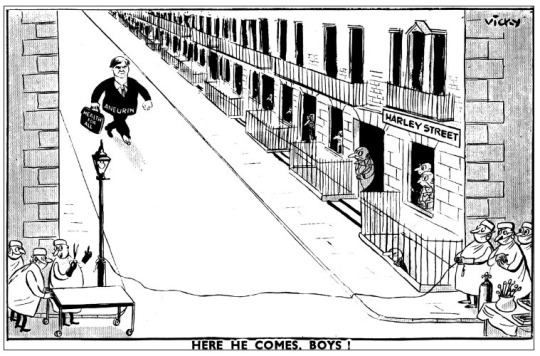
#uk nhs#social history#uk politics#working class history#social justice#society#uk history#uk government#democracy#nhs england#welfare state#universal healthcare#aneurin bevan#clement attlee#modern history#beveridge report#medical history
6 notes
·
View notes
Text
A pep talk for beleaguered AIOC personnel in Abadan from British Premier Clement Attlee, who expressed hope that Iranians would “soon realize the harm which their present Government is causing…”
The Mossadegh Project
#iran#britain#ckement attlee#iranian#tehran#british#prime minister#oil#british petroleum#oil workers#mossadegh#middle east#foreign policy#cold war#oil industry#oil refinery#oil and gas#foreign affairs#history#persian
1 note
·
View note

